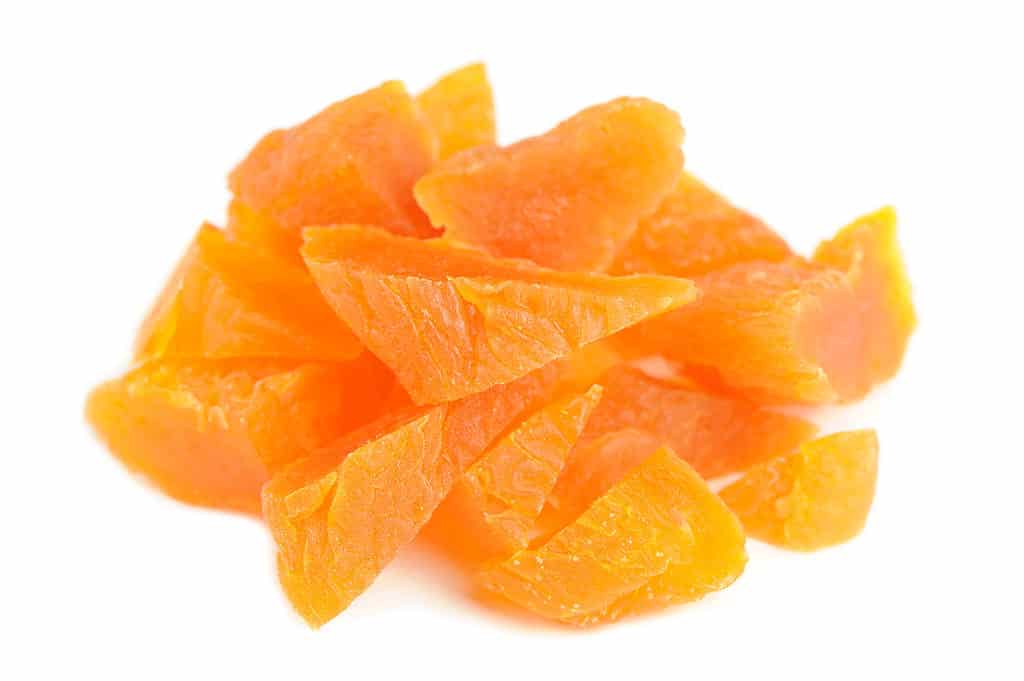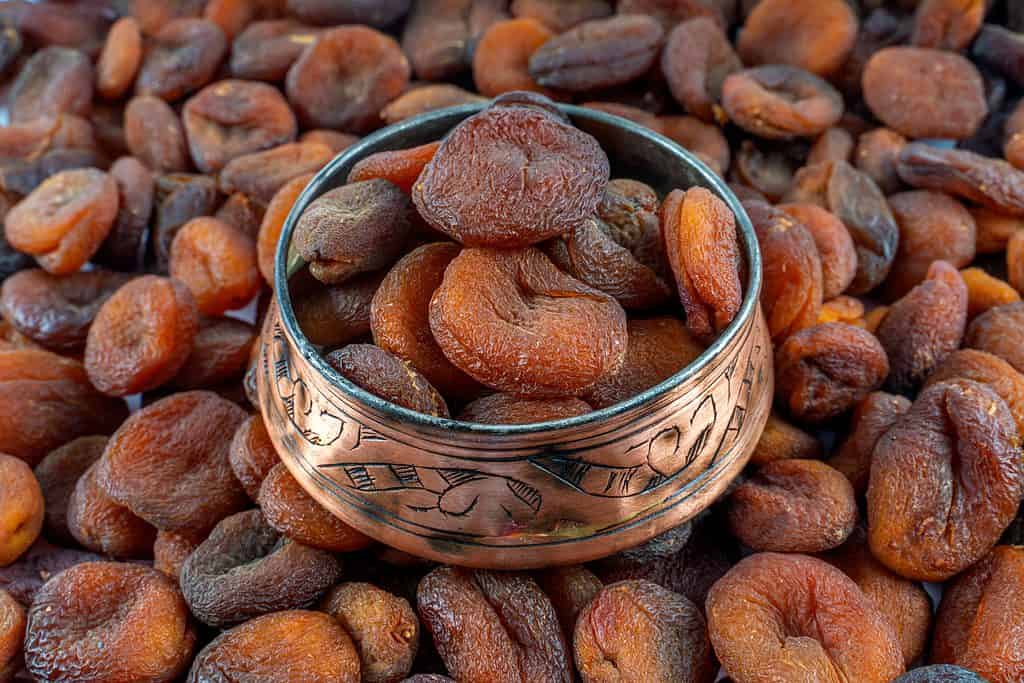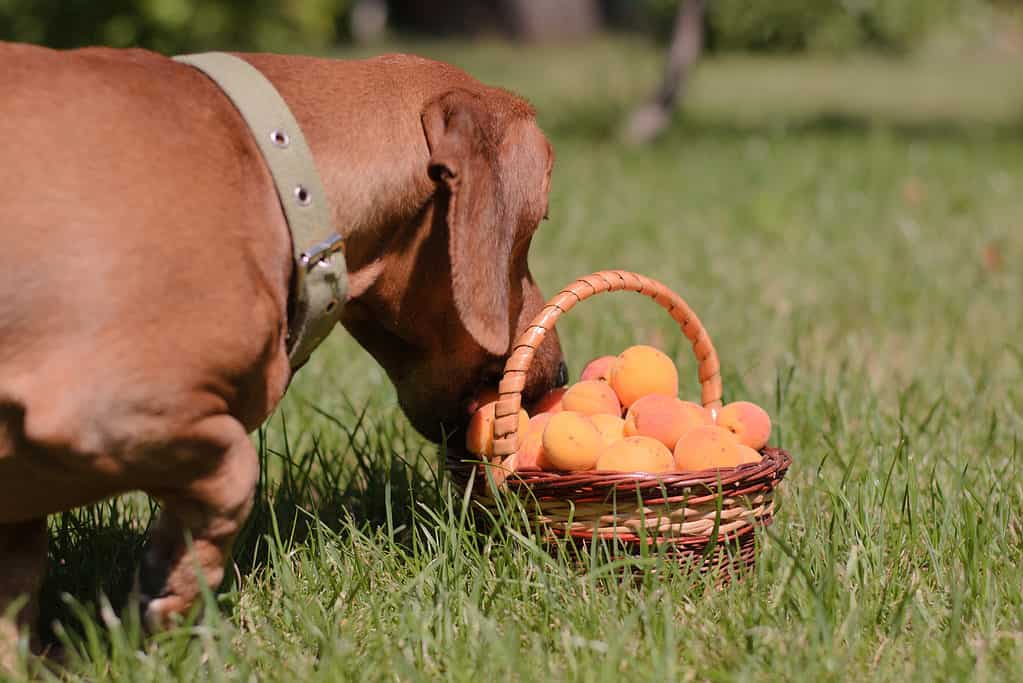Dried apricots are a quick, nutritious snack for humans on the go, but just because they’re good for us it doesn’t automatically mean they’re good for our canine friends too. Dogs can eat many different types of fruit, but can dogs eat dried apricots?
Let’s take a closer look at the benefits and risks of dried apricots and find out whether Rover can safely enjoy this snack with you.
Are Dried Apricots Safe for Dogs to Eat?
Generally speaking, yes dried apricots are safe for dogs to eat, but that doesn’t mean they should eat lots of them.
A chopped dried apricot on occasion won’t do any harm and they contain lots of dog-friendly nutrients, but the pit (stone), leaves, and stem are toxic and dried apricots can be sweetened with sugar or xylitol, so there are risks.
More about the specific dangers later on.

©Imageman/Shutterstock.com
What are Dried Apricots?
Dried apricots are fresh apricots that have been dried out using either sunshine or sulfur dioxide. You can tell the difference because sulfur dioxide produces bright vivid fruit whereas sun drying creates dark brown fruits.
Apricots are native to the Chinese-Russian border and were spread across Europe by the Roman Empire. They were a valuable commodity on the central Asian silk road for centuries because dried apricots could be transported for a long period of time without spoiling.
Dried apricots featured in many medieval European recipes and were a real treat at Christmas time in sweet puddings and pies. Apricots spread to the United States in the 1700s when the first settlers arrived and they were very easy to grow in the sunshine states. Today, California is a major apricot producer.

©Filiz Haksal/Shutterstock.com
Health Benefits of Dried Apricots
The healthiest apricots are sun-dried organically grown versions that are free from sweeteners, but all dried apricots contain the following nutrients:
- Retinol (Vitamin A) – is important for great vision
- Vitamin C – supports a healthy immune system and quick healing of wounds
- Vitamin E – is important for a healthy coat. It’s especially good for dogs with dry skin
- Potassium – maintains fluid levels in cells
- Copper – supports energy levels, connective tissue formation, and healthy blood cells
- Beta carotene – gives apricots their golden color. It’s a potent antioxidant that protects against diseases
- Lutein – a strong anti-inflammatory that supports eye health
As well as these essential nutrients apricots are packed with fiber. You may know how fibrous dried apricots are if you’ve overindulged!
They have been used medicinally to relieve constipation for millennia and because they are quicker and less messy to eat than fresh apricots, many of us have been caught out! The same goes for your pooch. All dogs are different, but more than one a day for large breeds or half for small breeds is asking for trouble.
Risks of Dried Apricots
Dried apricots are healthy, but there are some risks to consider:
Sweeteners
Plain dried apricots won’t usually cause an issue, but some are sweetened and this is a problem. Sugar causes dental decay and adds unnecessary pounds to your dog’s waistline. Because dry apricots are smaller than fresh ones it’s much easier to eat more and before you know it, your dog has eaten far too much sugar.
Another issue is the potential for xylitol. This artificial sweetener is highly toxic to dogs because it can cause hypoglycemia. In some cases xylitol (in stolen chewing gum) has killed dogs.
Sulfur dioxide
There are studies suggesting sulfur dioxide is bad for dogs and can cause neurological damage. Generally speaking, the brighter a dried apricot is, the more sulfur dioxide has been used to dry it. Organic dried apricots are a better choice because they’re usually sun dried without any preservative, but they are difficult to find unless you’re near a health food store.
Chewy choking hazard
Dried apricots are chewy (that’s the best bit!) but chewy foods aren’t a good idea for dogs, especially if they snatch and gulp. A whole dried apricot could cause choking or an intestinal blockage. Smaller breeds are more at risk, but it’s best to cut up a dried aprcot before feeding it to any sized pooch. It makes it last longer too, so your dog thinks they are getting more!
Gastric upsets
We’ve already seen dried apricots are full of fiber, which is important for healthy bowels, but in excess it can cause an upset stomach. Flatulence, diarrhea, and vomiting are distressing for dogs and messy to clear up. If an upset occurs after eating too many apricots, offer plenty of fresh water and feed them small regular meals of plain chicken or turkey with rice to help firm up their stools.
On the flip side, if your dog is constipated, a few apricots may get things going and avoid a vet trip!
Cyanide poisoning
It’s rare with dried apricots because the leaves and stone (pit) are removed, but there is a risk of cyanide poisoning if your dog eats an apricot’s leaves, stem or pit.
The symptoms of cyanide poisoning include panting, dilated pupils, tremors, and collapse because cyanide lowers the body’s ability to use oxygen. |It’s a medical emergency that can occur within 15-20 minutes of ingesting the poison, so always call a vet right away if your dog eats an apricot pit.
Never feed your dog mixed dried fruits
Although dried apricots are not toxic to dogs, other dried fruits are. Grapes are toxic and when they’re dried out they become sultanas or raisins. Currants also have the potential to poison Lassie, and the regular pairing of dried fruits with toxic macademia nuts is another hazard.
It’s best to avoid giving any dried fruit, nut, or trail mix combination to a dog because it’s highly likely to contain at least one of these toxic ingredients.

©iStock.com/igorr1
How Many Dried Apricots Can Dogs Eat?
Dried apricots should be fed in moderation because they can cause stomach upsets. The ASPCA recommends dogs consume no more than 10% of their daily diet in treat foods and the rest from complete dog food. However, 10% of their diet in dried apricots will no doubt cause diarrhea of epic proportions!
Generally speaking, a large breed dog could eat one a day, but a small breed only one quarter to a half.
How to Give Dogs Dried Apricots?
If you want to give your dog a dried apricot on occasion the best way is to cut it open to check that all of the pit and stem is gone. Then slice it into smaller pieces before letting Rover dig in.
Small slices of dried apricot are a good way to train food-motivated dogs to recall or keep anxious dogs busy when you leave the house. Pop a few slices in a puzzle toy and let them spend time trying to extract the sweet treat.
How About Fresh Apricots?
Once the pit, leaves, and stem are removed fresh apricots are a better choice for dogs because they’re free from sulfur dioxide, sugar, or xylitol.
However, it’s vital the pit is removed before giving dogs an apricot. The pit is the large, hard seed inside a stone fruit. Cherries, peaches, and plums also have a dog toxic pit that must be removed before it’s safe. Pits are also a choking hazard and because they are so hard, they can break teeth off too.
This makes stone fruit trees a real hazard for dogs. If you have one, take care that your dog doesn’t vacuum up the fallen fruits because it can be fatal.

©Anna Dembitskaya/Shutterstock.com
What Foods are Dog Toxic?
As well as apricot pits, leaves and stems, there are other dog-toxic foods to be aware of.
Avocado, xylitol, alcohol, grapes, macadamia nuts, nutmeg, black walnuts, onions, garlic, and chocolate are toxic and must be avoided. Foods that include them such as garlic bread, low-sugar yogurt, and salads are all dangerous too.
Are Dried Apricots Dangerous for Dogs?
No, dried apricots are not dangerous for dogs if they’re unsweetened, given in moderation, and sliced up. However, apricot stones, leaves, and stems are dangerous, as are dried apricots coated in artificial sweeteners.
Up Next
- Can Dogs Eat Salad?
- Use Extreme Caution If Dogs Eat Cherries! Here’s Why
- Can Dogs Eat Peaches? Are They Good or Bad?
The post Can Dogs Eat Dried Apricots? appeared first on AZ Animals.
from Animal News, Facts, Rankings, and More! - AZ Animals https://ift.tt/zQXtfN6